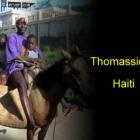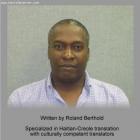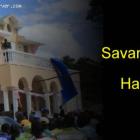ADVERTISEMENT
Education
The education system in Haiti faces shortages in educational supplies and qualified teachers, and the rural population remains underrepresented in the country%u2019s classrooms.There are many challenges. Currently, most Haitian schools are private rather than state-funded
Ecole Elie Dubois in Port-au-Prince
Ecole Elie Dubois in Port-au-Prince is a vocational school for girls. It is located only 2 blocks away from the Presidential Palace located at downtown Port-au-Price. This vocational school is run by 7 nuns. These nuns, including director Soeur Josette, used to live in the campus of the Ecole Elie Dubios School before the Island country was hit by the devastating earthquake in 2010. As of date, these nuns commute across the capital city Port-au-Price. The school campus has several historic buildings that were damaged because of the earthquake but are currently being restored along with rest of the campus.
College Notre Dame Du Perpetuel Secours, Cap-Haitian
College Notre Dame Du Perpetuel Secours, Cap-Haitian is Roman Catholic private primary and secondary school for males only. Congregation of Holy Cross in Cap-Haïtien established the school is Haiti in the year 1904. 4 secular Catholic Priest originally ruled the school but the Brothers of Christian Instruction also presided over the school. The Brothers of Christian Instruction also presided over various educational institutions of religious foundation spread through the island country. Over 90% of the College Notre Dame Du Perpetuel Secours, Cap-Haitian attend some institution for higher education of which, the Universite Notre Dame d'Haiti is the most prominent one.
Collge Canado-Haitien, Port-au-Prince
Located at Port-au-Prince in Haiti, the Collège Canado-Haitien is a school that was established in 1969 in Turgeau. The school was founded by Brothers of the Sacred Heart. Canado-Haitien later integrated students attending high school in other schools founded by Brothers of the Sacred Heart like Saint-Jean L'Evangeliste, Pope John XVIII School and Liberia School. The Canado-Haitien also served students of other schools like Saint-Louis de Gonzague School, The Petit Séminaire Collège Saint Martial and others.
Collège Canado-Haitien had a four-floor campus before the 2010 earthquake and consisted of 31 classrooms, the secretariat, a cafeteria, a library, an auditorium, the Direction (place for bureau of counselors, asst. principals and principals), two volleyball and two basketball courts. Right next to the Collège Canado-Haitien was the center of Canado-technical center. The building of Canado-technical center was also hit by the earthquake and was damaged severely. It is now being repaired. The Collège Canado-Haitien was hit badly and of 31 classrooms, only 3 are intact. The Direction, the secretariat and the cafeteria were not harmed by the earthquake.
Lyonel Trouillot and his love for writing
Born in Port-au-Prince on the last day of December 1956, Lyonel Trouillot grew up with an interest in literature. From a family of lawyers, Trouillot began following the prescribed route early on and studied law until his love of the written word won out and he started writing seriously.
He was forced to leave Haiti in the 1980's due to the regime of Jean-Claude Duvalier and he ran to America. Having not lost his love of writing, Trouillot continued to write for magazines, newspapers and other publications as he'd done in Haiti, and also across the Diaspora. He created essays, novels, poems, and even song lyrics in the case of songs by artists such as Jean Coulanges, Manno Charlemagne, Atis Endepandan and Tambou Libète.
Marie-Celie Agnant, Haitian Writer
Not all writers begin their stories at the same place. Since 'Once upon a time' isn't half so important as the 'Happily ever after', it is no strike against her that Marie-Célie Agnant didn't begin her personal narrative at the same start as others in the field of literature, as an aspiring writer.
Born in the Haitian capital city, Port-au-Princ, in 1953, Agnant worked as an interpreter and as a translator for many years. After moving to Quebec, Canada at the start of the 70's she also worked as a French teacher before reentering the world as a storyteller. With many shorts, full blown novels, children's books and poems under her belt, Agnant has truly transitioned into a storyteller of more than simple worth to the Haitian literary heritage.
Rene Depestre, Famous Haitian Writer
Haiti's most famously remembered, celebrated and praised writers seemed to all tend towards not just the literary arts, but a decidedly political activism. Whether it is the art which inspired the politics or the politics which gave way to the great art, in the case of the writings of Rene Depestre, both appear hand-in-hand, twain catalysts which drove him to create essays, novels, short stories and his famous poetry.
Rene Depestre was born in Jacmel on August 29, 1926, but, when his father died ten years later, he went to Port-au-Prince to live with his grandmother. The nostalgia of leaving his remaining family would later greatly influence his work. His debut poetry collection, entitled, 'Étincelles' was published in 1945. Just shy of 20 years old he also co-founded a magazine which would later have the distinction of having an edition seized by the government in their first year for the homage paid to Breton.
Dany Laferriere, How To Make Love To A Negro Without Getting Tired
Haitian born writer Dany Laferrière has spent his career writing things that provoke. From his work in the weekly 'Le Petit Samedi Soir' to his first novel, 'How to make love to a Negro' (1987), Laferrière has carved his success with the blade of controversy, whether real or formulated.
He was born in Port-au-Prince as Windsor Kléber Laferrière on April 13, 1953. After growing up in Petit Goâve, he began working as a journalist until the late 1970's when the weekly he wrote in collaboration with Gaston Raymond most likely led to the murder of the latter. Laferrière felt it best to relocate to Canada.
Felix Morisseau-Leroy, first significant Poet to write in Haitian Creole
The list of ordinary men, not kings or presidents or any other in an official capacity, who have influenced true and lasting forward movement in their home countries, is a short one. The list of Haitian writers who have created a legacy of literary, social and political worth is shorter still. The efforts of one such ordinary Haitian writer puts him at the pinnacle of both lists and elevates him from an ordinary Haitian writer to a legend of extraordinary significance to Haiti, it's Diaspora and many other countries in the world.
Morisseau-Leroy lived a long life from 1912 to 1998. At the beginning, his upbringing in a prosperous mulatto family saw him well-educated and fluent in French and English. His lucky, unchallenged existence was soon broadened by the addition of a wife, whom he credited as his muse, who famously admired his horsemanship, and would later give him three children.
Jacques Roumain, Famous Haitian writer
"I am this: this earth here, and I have it in my blood. Look at my color; it seems as though the earth faded onto me and onto you too."
Jacques Roumain, like many of history's other literary giants, lived a short life but managed to leave such brilliant words behind they would be spoken for centuries following his death. Through his poems he opened up a colorful, complex world that harkened to the struggles of his contemporaries and has given fodder for great new works by those he inspired and homage-paying re-enactments in the present.
Jacques-Stephen Alexis Haitian Novelist
Jacques-Stephen Alexis was born in 1922 with literary blood already in his veins courtesy of his writer father, Stephen Alexis. His upbringing in Haiti and the influence of other prolific Haitian writers, like Jacques Roumain before him, molded Alexis into one of the country's most well loved writers.
Though he'd completed his schooling in medicine, writing had remained a passion and he gained early recognition on his first piece, an essay on the poet, Hamilton Garoute. This early success was soon followed by his work with La Ruche and then by a string of novels which tended towards the heavy narrative telling of the Haitian city-dwelling peasant.
Our objective is to share with you news and information about Haiti and the people of Haiti. Traditions, habits and the way we were or grew are alive in this site. We highly recommend that you Subscribe to our Newsletter and also share with us some of the things that are memorable and made us unique people.

 Thomassique, Haiti
Thomassique, Haiti  Informative Marketing and Advertising in the Haitian Community
Informative Marketing and Advertising in the Haitian Community  Haitian Creole Translation
Haitian Creole Translation  Life After Death
Life After Death  The Town of Savanette, Haiti
The Town of Savanette, Haiti